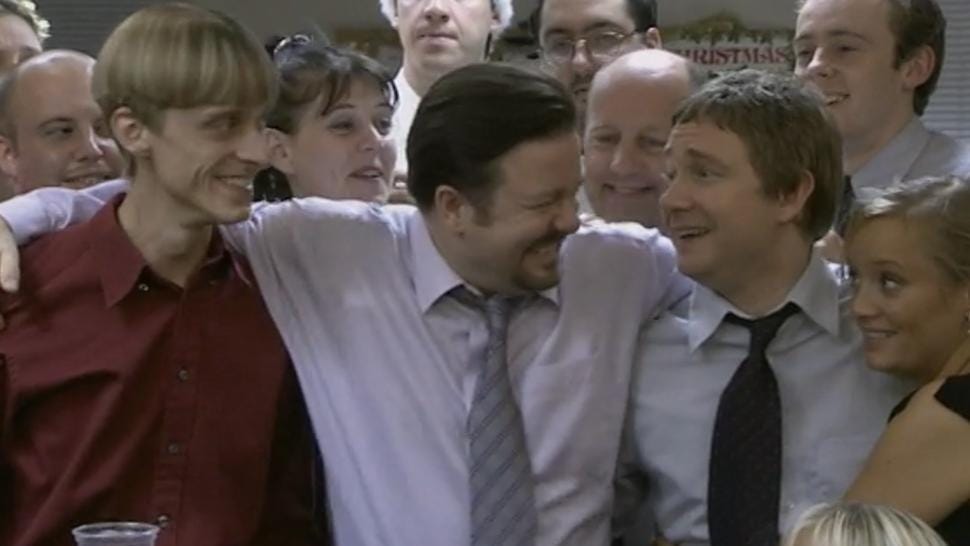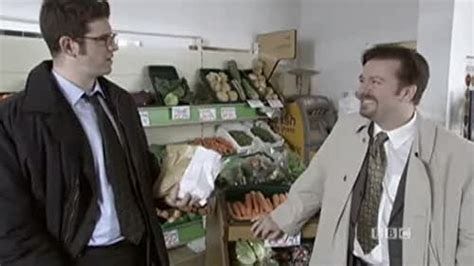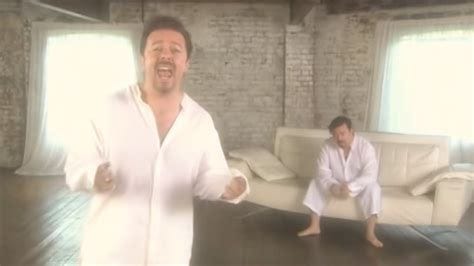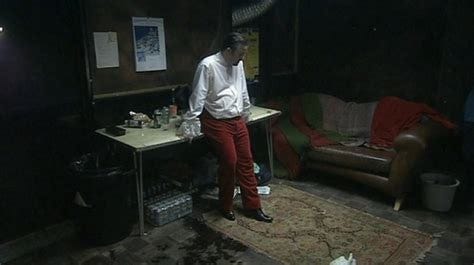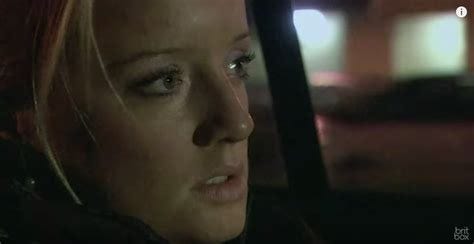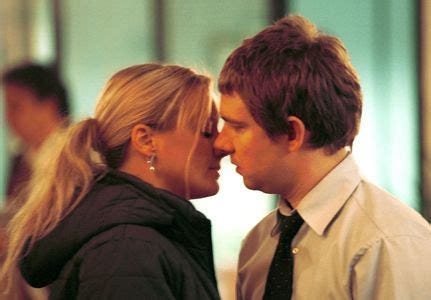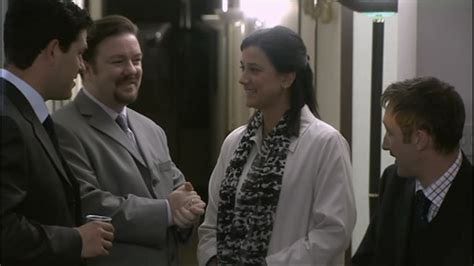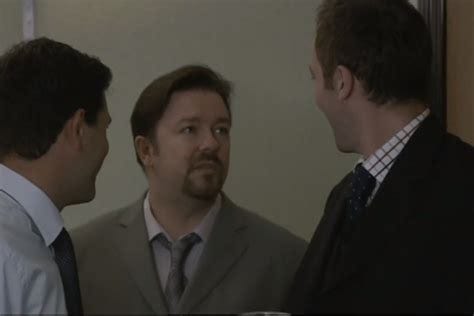This is the conclusion to a series on The Office (UK) that began here and has concluded on the 20th anniversary of the Christmas Specials. You can read the rest on Medium: S1E2, S1E3, S1E4, S1E5, S1E6, S2E1, S2E2, S2E3, S2E4, S2E5, S2E6.
December also saw the release of Yorgos Lanthimos’s film adaptation of Alasdair Gray’s novel Poor Things; I wrote about three other Gray books deserving wider fame for LitHub.
I’ve not done any end-of-year lists but thought the only noble use of such is to boost what my readers might not otherwise have heard of. So: my best short story collection of 2023 was Truth & Dare by
, whom I interviewed here and here; my favourite new novel Sanderson’s Isle by James Clarke, which I wrote about here; my favourite criticism a toss-up between everything available by Michael Maar in English, and Michael Wood’s Landmark Literature entry on A Hundred Years of Solitude; and favourite film you’ve not heard of and didn’t come out in 2023, Escape from the ‘Liberty’ Cinema, a riposte to The Purple Rose of Cairo via Polish solidarność. I also, as you can see, watched a lot of The Office.Deluded buffoons, the sting of fame, vulgar jokes cutting through lofty rhetoric were at the birthplace of modern humour: Cervantes’ Don Quixote. A novel of two gargantuan halves, its conceit is that Part 1, published ten years first, has brought fame to its hero, the old man who believes he’s a knight. And so the people on the road he and his stout squire Sancho Panza meet in Part 2 recognise who they are, bait and beat them, and join in their delusions to make further fools of them.
The Office Christmas Specials start with a title card telling us that “Nearly 3 years” have passed since the office documentary aired. In that interim David Brent has not exactly become famous. Though a man in a shop does ask for his autograph he initially mistook him for “the fat one from The Airport”. When people on the streets recognise him it’s only to yell “Lard Boy” or “Absolutely Flabulous.”
Not even the most affecting moment from The Office series 2 finale could resist the Media Midas touch that turns everything into lad-bants fodder. David, out of a job, choking back tears with now former bosses Neil and Jennifer is traduced by a chuckling Gareth, who would’ve watched along on TV: “He begged for it back!”
David shares the lesson he’s learnt since: the documentary was “a stitch-up” as he says in his opening interview for the Specials. This critique of the mechanics of reality TV is one we’re now familiar with and still immune to: that those on it we love or hate are concocted by editing (so that the “one time you accidentally headbutt an interviewee [it] makes it to the programme1). Maybe this is why the documentary has a new feature: a female interviewer’s voice off-camera, as though to fess-up to the presence of the shapers of the story, to encourage David et al back.
But he appears to doubt whether he himself is telling the whole story; though he accuses the documentary of looking for a scapegoat he has to wonder whether he’s looking for his own. Because he sounds like he’s fishing for a denial when he closes this cold open by insisting: “I am not a plonker.”
If Brent doesn’t know himself by now
Don Quixote isn’t deluded that he’s a knight, he becomes one by living by chivalric virtues: defending the weak, showing generosity, obeying feudal duties. Meanwhile David frames his life since the documentary as a case of “duty calls”; it’d “literally be a sin to waste” his fame. Part of this largesse is how he chose to spend £42,000.
This is the out-of-court settlement he won after suing Wernham Hogg for his redundancy. At Gareth’s snide prompting, David reluctantly itemises how he spent the settlement money on studio time and PR costs to release a single on his own label (“Juxtaposition Records”).
Characteristically the single is a cover song; David would rather inherit a known quality as a short-cut to fame than release one of the songs from the repertoire of his old band, Foregone Conclusions, which we heard in the Training Day episode. In the first stand-out sequence of the Specials we get to see the music video that accompanied his version of Harold Melvin and the Blue Notes’ ‘If you don’t know me by now’.
As David’s last song of the show it pulls out all the stops. There’s his mincing look and sound, from his eyeliner to the way he sings “whall the things I’ve done” and ad-libs “No you don’t, no”; and his props, a Buddha statue and released white dove. Then there’s the weird subtext of the way the actress he’s cast as his disappointed lover (and who does a mean march off camera) resembles his old boss that fired him, Jennifer Taylor-Clarke.
But the world won’t listen. His single didn’t break The Top 100 (though it wasn’t far off, placing at 113 as David clarifies to a club rep, so well within the Top 400 unlike said rep claimed). Gareth says he bought five copies out of sympathy, not given to his friends but put in the garage.
That’s five out of 150 David says he sold. But that total wasn’t his only contribution to culture. At the start of the last series he’d described himself to Neil’s staff as “a chilled-out entertainer”. This has come to pass — in the worst way. As he tells Neil in the Specials, he’s repping by day and doing celeb appearances by night.
Not in order to “chase fame per se”, he’s sure to clarify. He compares himself to Noel Edmonds, “going round hospitals at Christmas giving out presents… not doing it for himself, he’s doing it for them”2; then compares his apperances to the sight of Richard Blackwood in Welsh town Lampeter, giving the residents a non-racist shock, i.e. the provincial proles would be lucky to see a celeb like him.
David’s rigged-up magnanimousness doesn’t reach as far as Wales but does cover the aptly named nightclub, Mumbo Jumbos. (Later we hear of another club, Malibu’s in Bracknell, one of the towns David roll-called in the Series 2 finale as an example of his broader horizons post-Wernham Hogg.) In the lobby, his gormless agent Peter explains the grift: cargo-cult celebrity. His clients are cover bands, tribute acts, and what in his charmingly childish way he calls looky-likeys, such as Kirk (that is, Michael) Douglas, who’ll hang around your party for a fee. Peter’s one line that brings him out of his camera-shy monotone is to tell David he has to do public appearances at clubs because he’s “nowhere near famous enough” to warrant his own looky-like.
We witness the first of David’s P.A.s when he comes on stage raggedly applauded to the ironic tune of ‘Feeling Hot Hot Hot’, moments before some rejects from Pop Stars (another reality TV show for the desperately seeking). In a one-minute interview he sketches his future plans and charity walks for Mencap before waving and leaving the stage to the same tune. What letter-of-the-alphabet-list celebrity is this?
The “dumbing down” documentary that made David notorious is the same he’s returned to, so dogged is his quest for celebrity. (It’s as though the crew of the Specials are the Quixote-fans who only encourage the old-man-turned-knight for beats and giggles.) And so they’re on hand to record the final depths to which the celebrity they gave him will take him.
Which means the abysmal moment at the end of the first Special. David appears in a night-club rendition of the gameshow Blind Date alongside real-life minor celebs Bubble from Big Brother, and Howard Donald, a man who starred in a bank advert that spoofed the song ‘Who let the dogs out?’ (copies of copies). As for David he’s not come as himself. Maybe to distract from his shaky name-brand recognition he’s come as Austin Powers.
The trio of celebs are answering questions to win a date with Kim, who likes “daaancing!” and “footbaaall” and is, according to the host, “a right little raver.” As such, she’s happy to ask, “What was that shit?” after David undercuts his rival’s innuendo with pedantry, and interrupts her question with his premature “Shagadelic baby, groovy.” She maintains the potty-mouth when she sees contestant number 2, asking, “Who the fuck’s that?” David is either not recognised or misrecognised; fame is a harsh stress. Instead of more fat jokes, someone in the audience heckles him with the simple “Wanker.”
David tries to restore his pride by dunking on the audience, saying the work is money for old rope, parting £8 per fool: “They’re the wanker.”3 But that money isn’t enough. With the words “Never work with amateurs” he picks a fight with one, throwing back at Kim, “What was your shit?” Harold from the bank ad intervenes and David almost salvages his dignity with his reply: “If I wanted your advice it’d be about mortgages.” But any dignity goes down the drain with the beer Kim throws in his face, followed by a second one.
Peter warns him to get the Austin Powers costume dry-cleaned now. In a fit not half as hissy as it looks David pretends to rip the costume instead. (The post-credits shot is him diligently picking up the pieces.) Rubbing the beer in, as it were, “cretin” Peter admits that the second beer was David’s own, then resists breaking into a £20 note to replace it. (Useless Peter anticipates Stephen Merchant’s role in Extras). Doused David by himself in a dowdy green-room is the show’s bleakest image.
Even so in the second Special he’s still doing the P.A.s, as seen in montage, till his throw of merch into a crowd gets him a bottle in the face back. (The lyrics of the song in the background are: “Hey what’s wrong with you? you’re looking kind of down to me”.) At last David, who’s tolerated a Marmite-stained gusset thrown by well-prepared hecklers, can tolerate no more, nor suppress his self-awareness. He’s just not good at crowd work: booed by the Blind Date audience, he called them sexist. He acknowledges to Peter that the work is “demeaning”, it’s “just waving” to “idiots”.
Peter, though, pops David’s self-awareness by re-inflating his ego (if bathetically, comparing him to another “perfectionist”, radio presenter Bruno Brooks). David hasn’t sworn off celebrity yet, he just wants a better kind. He’s “an anecdotalist”, he has “stuff to say if people would just listen” (nowadays David would have a braying 3-hour-per-episode podcast) but, as he adds with a voice boiling over in rage “they won’t”. When he asks to get on Michael Parkinson’s talkshow, Peter deflates his ego back down: the show’s for people who have done something i.e. not for celebs so much as the famed. David counters that John McCarthy, a hostage in Beirut, didn’t do anything, he just got chained to a radiator. This is both an inappropriate comparison in PC terms, and an appropriate one for David. The greatest hostage to fortune is the wannabe celebrity.
You’ll never work in a place like this again
The day-side of David’s celebrity is working as a travelling cleaning supplies rep. And Sales does seem to better suit his tendency for slogans and patter more than Management did; his “You remove the stain-job, not the paint-job” gets a dozen chammy cloths sold.
But it’s also a job with a lunch hour in a lay-by eating a Ginster’s pasty. David denies this Partridgeseque picture of loneliness by boasting he can drive his mobile office 70mph (“tops”) and send a fax, albeit not from his car but the Ramada Inn in Reading. This is the life he means when telling Neil, “I’m lucky!”
Redundancy hasn’t cut David off from his nemesis. David haunts the Slough branch of Wernham Hogg, unable to move on. Seeing as his former staff will have watched him on TV begging for his job (and watched his music video) this smacks of desperation if not masochism.
One former staff is now the new manager, Gareth, despite having only one O-Level as David brings up when the two hate-laugh at each other. Neither does the promotion deter David from asking Gareth whether he’d jump in his grave so fast, or refusing his insistence that he call ahead when he visits the office.
More openly resentful of David’s visits is Neil, whose first encounter with David in the Specials starts with an insinuating dig at him to not keep staff from their work. But when David brings in a dog with him, it’s the final paw: Neil escalates to a full-on dressing down, as if for old time’s sake.
They too are stuck in their pattern. David is still alternating stupidity — confused why the dog can’t be present for Neil’s private word, seeing as it doesn’t understand any — with deluded claims like his presence even as a ex-manager “boosting morale”. Neil takes a harder-line than Gareth: he bars David from “breezing in” since it’s “a business, not a social club” — a neat reminder of The Office’s core conflict.
David takes the barring politically, informing the office of it with the word salad that “the powers that be that deem it I undermine the regime.” Once again he’s at least partly to blame: what pushed things too far for Neil is David’s latest attempt to impress the TV crew with how right-on he is. Seeing as they’d cut his rendition of ‘No woman, no cry’, admired by “the office black guy” (whom he assures the new Shakespeare is Ice T and Dr Dre) David brought in his black dog, Nelson, named not for Horatio but Mandela. And after he’s barred he tells his staff to “Fight it” with fist in the air ANC-style.4
Just before Neil cut this last cord of David’s to his old life, he asks the provoking cameras not to follow them (they snoop through the blinds instead). That Neil could have cut it any time in the last three years but does so now on Christmas isn’t implausible Scroogery, or an unmotivated screenwriting convenience (i.e. Gervais/Merchant needing to dramatise a local change in status quo for David) but entirely in line with Neil, a man who, albeit more subtly than Chris Finch, always humiliates David on camera. And what better payback for David having made him responsible for his company forking out £42,000 than to wait for him to peek his head above the lens then smush his face in it one last time.
Asked by the interviewer whether he resents Neil, David stalls by pointlessly clarifying “The man or the boss?” before answering “neither”. Yet, staying at a Travel Lodge for £48 a night he gets more candid, smoking a cigar and swishing his mouth with minibar whisky. Inadvertently describing himself, he claims Neil will make “one too many mistakes” and that “he’s not the manager he thinks he is.” He then inverts his caught-on-camera grovel by saying Wernham Hogg will have to beg him back. When he slurrily warns them, twice, that, “This is gonna cost ya” he’s at his most bitterly assertive in the whole show. More inadvertence however: if only he knew he was warning himself!
Hot love on the hot love highway
The refreshing of David and Neil’s beef starts with the former not shaking hands with the latter, a snub that’s fast understandable. Granted, David has to have his congratulations dragged out of him on hearing Neil’s proposed to his girlfriend (it doesn’t help Chris ‘best mate’ Finch is present). But after Neil shows off a picture of his fiancée, Chris tells David he’s never seen a “stunner” like that without “a staple through her stomach”, i.e. as a centrefold, and Neil bursts out laughing.
It’s as though any departure from the usual nuptial cooing has Neil vindictively escalate the conflict (not least because David laughed when Neil said his wedding wasn’t till next year). Since David bragged about the perks he prefers in being “Young, free and single” (“<Screech> Motels!”) Neil calls his bluff, asking if David will want the two tickets for the office Christmas party, since presumably he’ll bring one of his “chicks”. The next time he sees David, he doesn’t let up, needling, “You still need two tickets?”
Who David will give the second one to depends on how he resolves his track record with women — or lack thereof. A song of his on Training Day had the lyric “She’s the serpent that guards the gates of hell”, while his poem ‘Excalibur’ was about some castrating paramour that’d stabbed an icicle of tears in his cock.5 Even when acting out a dialogue with a theoretical date he gets in a fight, telling ‘her’ to “back off” before skewing to his (second) denial that he’d ever “pay for it”.
So much for autobiographical reads of imaginary women. The nadir in the real world is Kim from celebrity Blind Date, and his epsilon-male threat to her. To get her back for throwing the beer, he makes as if to throw beer at her while whinging “You can’t hit a woman.” Having resolved the dilemma for him by knocking the beer into his face, Kim calls him a prick. Significantly, he responds with “Tart!”
From blind dates to online dating.6 David selects three from profiles that Gareth’s helped him screen (in a callback to the Brass Eye skit where a man is shown pictures of women and says “which ones he’d hump”).
We’re tricked by the first date into not expecting the worst. At a restaurant David pivots from an initial gaffe — he asked about his date’s necklace'; she thought he was pointing at her breasts — into a shared laugh. Some chemistry! What there is he then ruins with his subsequent, Gervais-like interest in “anthropology”, offering a cod-evo-psycho explanation for why men like breasts (they look like butts). The result: she confirms she’s not giving signals, skips ordering starters, and makes a request that’s never good to hear on a date: “Can we not talk about my dead mother’s breasts?”
Date Two meanwhile never gets off the ground. David has a pre-meet chat in his car for what sounds like another blind date, with them discussing how to recognise each other. He assures her she’ll spot him because he’s famous from the documentary, only for her to hope he’s not that “awful boss”. David fakes bad signal, hangs up, then does an irate dialogue with her for being too chatty: “Who are you? What’s your name? Too many questions.” (Note that “Who are you?” was David’s crap comeback to a heckler during Blind Date. It’s the Specials’ key question.)
David was the dud of the first date; for the third he’s the one “not bowled over.” His disappointment at the homely sight of Susan is an immediate “For fuck’s sake,” followed by the return of his question noise: “Urgh?” At their table in a smoky pub he smiles to passersby for help; he talks to Susan like she’s a slow kid about classical music despite his own shallow tastes (he likes “all the main hits” of Beethoven — “generally considered the best”); he then falls back on his penchant for facts on “any subject”, a predictable one about cows, less so about lemons; then he riles at her calling it out as his “party trick”. Abandoning niceties, he cuts short the ever-awkward question of a second date. His disappointment at her for being a heavier woman (and not one of the “happy bubbly ones”) is rescued from cruelty on the show’s part by her pointing out in return the mismatch between him and the signed glossy of his profile pic:
There’s a similar cruelty with his supposed final date. Waiting at the office’s main entrance— seen for the first time — he sees another heavy and also older woman cheerfully approach. David not only mistakes her for his date but tells her so (“I thought you were it”).7 The poor woman was just looking for the ever-named, never-seen Monkey Alan.
Before waiting at the entrance, David had been waiting in the office for three hours. His party spirit on arriving there — singing Pink, quoting Bo Selecta — was popped by Gareth the messenger: only present employees are allowed at the Christmas dinner, orders of Neil. (David has to have his dinner in a roadside grill.) Few places are more desolate than an empty office after-hours: for David it’s the ruins of his life as well. By the time others arrive he’s not recovered his spirits; only a bawdy joke from Chris Finch persuades him to stick around, till Neil joins, swiftly following his “Merry Christmas” with “Where’s your hot date?” David can’t contain his rage, calling Neil a fascist for his clock-watching. But we, like Neil, are all waiting for the next romantic disaster.
Heart in your mouth
Suspense over romance defines the Specials’ treatment of Tim and Dawn too. The will-they?-won’t-they? bounces and stretches out like a tennis rally. Will they get a happy ending together or stay in their separate miseries?
On Tim’s side we’re given the reminder that there’s nothing that can’t get more miserable. Gareth is now his boss, and though he still pranks him locking him in his own office, he no longer has an audience. The “new Dawn”, as David calls her, doesn’t laugh but releases Gareth; it’s like the tragic twinned lobster scenes in Annie Hall.
Taking Gareth’s place as Tim’s desk neighbour is a new character, the redeeming-featureless Anne. She’s a snob who chose to sit by Tim rather than her fellow Accounts team because she finds colleagues like Keith “grotesque”. She herself is a grotesque over-sharer, miming the rocking squat that she conceived with. Like Matthew Holness’s IT guy, she corrects mistakes through sarcasm, such as Tim’s significantly time-looped one about what year it is. She’s so self-involved he can’t even insult her mother-in-law’s choice of a Kama Sutra gift or undermine her claim about men’s infatuations with her because she doesn’t hear him. In fact she’s so self-involved she wanders off the path of her own anecdotes, and Tim’s prompt words have to nudge her back, a dark parody of an old couple. While he once called Gareth’s mind “amazing”, he’s dead behind the eyes listening to Anne slurp yoghurt off lids. She is not the new Gareth; she’s the inverse of Gareth. The sound of a baby crying over a shot of Tim as he watches her conception mime sums up his situation at the start of the Specials.
On Dawn’s side, the show and documentary toy with our suspense from the get-go: the first shocking sight of her in the Specials is her in America holding a baby; if she’s had one there with Lee then that kills her and Tim’s romance in the cradle. It’s a fake-out though; the baby is Lee’s nephew.
Lee and Dawn are well aware of the Romance Question, Dawn mortified for Tim and not wanting to talk more to save his feelings, and Lee surprisingly sanguine; when the interviewer asks Dawn “Were you embarrassed when Tim asked you out?” he cuts in “Which time?” Tim’s first word on the the most recent time is to wish he hadn’t done it, while also hinting at the fall-out from it: his “apparently” and “from what I hear” tell us he and Dawn are no longer in touch.
Gareth is the one to set the butterflies loose again in Tim’s stomach: he informs his staff there’ll be some blasts-from-the-past at the Christmas party: not only Pete Gibbons, whose leaving party David mentioned at the end of series 1, but “for those who cared or liked her” (i.e. Tim) Dawn as well, though Gareth’s sure to remind Tim she has a fiancé. And Gareth’s not the only colleague ratcheting the suspense: Keith in the break-room asks Tim whether he’s thinking about Dawn then gives advice about “a-wooing” between puffy bites of his Scotch egg. Again and again the question of how Tim and Dawn will resolve is emphasised as the Special’s main one.
The more Tim talks to the cameras the more he ruminates on the question. He’d hoped that “out of sight” would mean “out of mind” but it’s the thought of seeing her again that makes his stomach go “kkkhhh”; in his next camera address he teases that he won’t ask her out again or might or she’d have to ask him. This admits the wider screenwriting problem: the show itself can’t just do another rehash of him asking Dawn out and have us all wait for her answer; it’ll have to resolve their drama in a new way. But what?
At their agonising first re-encounter during the day, Tim has to wait on the outskirts while old acquaintances finish their greetings. (That weird way in which reunions tend to save the closest for last.) Straight off we’re reminded of their common sense of humour, which reminds us of the stakes behind the suspense: but they’d be so good together! They pick up where they left off by winding-up Gareth pretending he’s gay. (Another point to Anne’s role: she tells an unfunny anecdote about Dawn being mistaken for someone else — “I laarfed!” — and so contrasts her sense of ‘humour’ with Tim and Dawn’s.)
As well as a sense of humour (something that’s not just important to have but to share) Tim and Dawn share other virtues. It’s only when Anne cruelly puts down David’s request for someone to have a drink with him that Tim abruptly relents: “I’ll go for a drink with you, David.” Tim was always the most kind to him, saying his bad Clint Eastwood impression was “Spot on”. And when David made an obscure Dixon of Dock Green reference it was Dawn who humoured him with “Brilliant.” Both Tim and Dawn are teasers and not bullies, in fact they stand up against others being bullied: Dawn for David against Chris Finch at the office quiz, Tim for Gareth against sneery IT guy Simon.
Even when they don’t stand up to it, their simpatico natures are still in effect. With an oxymoronically aggressive “Excuse me” Anne tells Taffy at the party not to smoke around her “unborn child”; but Taffy is more than her dickish equal: he calls her a dozy cow and asks why he should care some “useless tosser” blew “his beans” up her “muff” — Anne storms off. Tim and Dawn are shocked then laugh but at the language used. Lee too laughed but during the tirade, and without shock but smiling through his cig. Still, the moment oughtn’t jar. Anne provoked some degree of comeuppance, a woman with such unabashed nuclear-family selfishness that she’d made out her kid was terminally sick to jump the queue at… “at Space Mountain”, even though, as prompting Tim says, “There probably were sick kids and you went straight past them.”
His and Dawn’s common sense of humour and of right-and-wrong merge towards the close of the Christmas party. All throughout they, and we the audience, have known they have till party’s end for one of them to get the other shoe to drop: Dawn’s flying back to America the next morning. Instead they do another, tipsier wind-up of Gareth for being gay. Eavesdropping Lee has nous enough to get what they’re doing where Gareth doesn’t; but not enough of Tim and Dawn’s empathy to keep the joke private: he points it out to Gareth, who for the first time sounds hurt. Lee caps his contribution with that classic miserable couple dynamic: he cuts short her social fun by ordering her home before she has “too much to drink” and moans “all day tomorrow”.
Fetching their Secret Santa presents, he leaves Tim and Dawn together. To a background cheer we hear the relevant needle-drop of Take That’s ‘Back for Good’. The shot keeps holding while we scream at one of them to act (it’s like the potential proposal during mushroom-picking in Anna Karenina). They exchange pained platitudes instead: when he says “It’s been really nice seeing you” it sounds more like a farewell than a goodbye; she protests, “Keep in touch” as we all do at the sunderings of office relationships. Tim kills the suspense with fake aggression to her returned fiancée: “Lee, you little…” And his heart is pulled by Dawn’s long walk away down a corridor for good.
Tim’s final address to camera mixes resignation with covert poetry — “Dawn was a ray of sunshine in my life”, one with whom he had more in common than colleagues who just walked “on the same bit of carpet for eight hours a day.” He offers a wistful image that in ten years he “could be married with kids, you never know”, pointing out that when they turn the cameras off “it’s not an ending.” But we do know, and it is an ending, because he’s in an artwork. Ironically, Tim conceding that “Life goes on” would seem to be the artwork’s closing statement. No happy endings, no closure; drama resolved with anti-climax.
Then in one last teasing shot Lee and Dawn’s cab slows down, but doesn’t stop; its break-lights come on, but just for the turn away it’s about to make…
Stupid cupid keeps on calling me
One cute meta-conceit about the Specials is that there are two TV shows bringing Tim and Dawn together. The Office does so with its chance incidents that are, of course, ordained by Gervais/Merchant. And yet they cop to any worries about ‘plot convenience’ and ‘manipulation’ by incorporating these into the form of the show: the office documentary is also manipulating the fates of its subjects. And so the show doesn’t swerve but harnesses the question of whether giving the audience what they want is pandering or satisfying.
First off the documentary flies out Dawn (and Lee) from her place of safety “million miles away”. Then, when she comes for her day-visit, Keith of all people says they’ll “have a good chat” at the Christmas party, hence confirming with her she’ll attend. Anne’s warning that “there’s nothing worse than an old mum” must also subliminally nudge Dawn, who we’ve seen broody with a baby, to a decision about whom she might want her own with.
Even Lee can be read as another inadvertent cupid. Though at first characteristically mistrustful of the TV crew’s offer to pay their flight back from America to Slough, he’s happy enough for the free flight to risk putting Dawn near Tim, and a mummy’s-boy enough that he’s not there for their first meet. And when they all do re-meet Lee is relaxed. The psychological read of this is that he’s over-confident in how much he’s worn down Dawn. But it’s also as if he as well is putting the lovebirds on their flight-path. However, it’s two appropriately minor characters that, in a mundane way, seal Tim and Dawn’s fate.
So this is Christmas
Someone carries a disco ball up a step-ladder against a background of mundane office work; tinsel hangs over phone trills. To emphasise this parallel between work and Christmas, the show smash-cuts from the empty office to the party office at the drop of ‘Merry Christmas everyone.’
For this occasion to be when and where Gervais and Merchant set the finale of their show wasn’t arbitrary, and neither was it merely a marketing ploy. Is there anything more soppy-sentimental, more bleak yet more filled with valedictory ‘Ah, fuck it’ spirit than an office Christmas party?
What their characters see in Christmas is relevant. Lee thinks it’s a con, sitting on his phone with a bored Dawn during their, that is her Christmas shopping: he doesn’t buy gifts, just tells her to take the money out his wallet (“I’m thinking of wrapping it this year” she wise-cracks to herself). Gareth shares Lee’s bah humbuggery, requesting a “tenner in an envelope” and not any novelty gift from Secret Santa; cynical as he is, Tim believes in the spirit of Christmas enough to chide Gareth for his lack. Likewise Dawn loves Christmas, she gets “more excited about watching people open their presents than they do.” And presents are pivotal to the show’s ending.
It’s bawdy Trudy who provides the first half of the key to it, for she’s the one who suggested Secret Santa at a team meeting about Christmas party ideas (better than the wet t-shirt contest and “something for the old people” otherwise suggested.) The name Tim draws for Secret Santa has him groan, “I’m not getting him one”—‘him’ being, we can guess, Gareth. So Jamie offers the second half of the key: swapping an unseen name with Tim. Had it not been for this modest empathetic gesture from Jamie, Tim and Dawn’s story might have ended very differently. And so subtle are Trudy and Jamie’s contributions to how that story ends that Gervais and Merchant avoid all appearance of contrivance.
What Tim will do with what Jamie and fate have handed him centres on the story-line of Dawn’s dreams to be an illustrator, first raised at the end of Series 2. In the Specials, as she drives through low-expectation Slough, she rationalises giving up her dreams by citing “priorities and time and bwaah”. Gareth of all people endorses this choice: illustration was a “waste of time.” And when Tim asks Lee to encourage her more, Lee says they’d agreed “making a living’s gotta come first”. Work, jobs, the office life of The Office seems to have had the last word. Despite this general lack of support Dawn gives the one person who believes in her, Tim, a hand-drawn sketch of him (albeit with too small a nose, in Anne’s opinion).
His return of that sketch to her, enclosed with a box of paints he got her for Secret Santa, plus the message ‘Never give up’ is what finally brings Dawn together with Tim. But the documentary and mockumentary were the real matchmakers. The show that’s been David Brent’s undoing is Tim and Dawn’s doing.
Dawn comes back for good, not to Take That but Yazoo’s ‘Only You’, mentioned a series ago, and played by DJ Keith, whose last set was at the end-of-financial-year party. She finds Tim on the outskirts of an inane riddle with which David is stumping Gareth (a prophecy of Karl Pilkington). A few episodes ago one of David’s fellow management trainers had told his audience, “You’re in the driving seat.” Dawn might have been in the passenger seat but she got off the cab and turned her life around.
Laughter in the dark
Tim and Dawn’s ending ‘makes sense’ as they say. But what about David’s?
He re-enters the Christmas party with his date at last: plausibly attractive, age-appropriate Carol. Though she alarms him at first by asking for pint thereof of vodka she turns out to be a wind-up merchant, hence a good fit. David’s smug look and Neil’s disappointed one are in fact the first of the episode’s fuck-off’s.
Best of all, Carol bucks our Quixotic expectations: she herself never watched the office documentary. Though he patronises her about the “crafty” way reality TV works — and in doing so gives a quick summary of The Office: the head-butt of Karen Roper, his songs as on Training Day — she is less defeatist, more philosophic. Instead of despairing of his ill-found fame, finding his celeb PAs embarrassing, like he’s started to admit to, he should take the money and spend it on something he does like doing. She’s even amused and not put-off by David’s dance moves, of which we get a quick reminder to the tune of Boney M’s ‘Mary’s Boy Child’.
For his part David is bowled over. He’d tried to minimise Neil’s stunner of a fiancé by saying he preferred someone a bit more intellectual only to learn she’s a doctor. But Carol’s the same combo; she’s “as intelligent or slightly less intelligent” than him, like he prefers; she’s “got it going on upstairs as well as down”.
As for Carol’s verdict, it treads the line of guardedly hence plausibly reciprocated attraction: she tells the camera David’s “funny” and “wants to try her Thai food”. In one last moment of suspense the interviewer asks whether she’d see him again though. Carol at first appears to give an equivocal nod before she relieves us with her assent: “Yeah, think so.” (And this despite David spying on what verdict he’s getting.) She even mimes from her cab a ‘Call me’ and David grins more honestly than we’ve ever seen.
After that positive climax and before Tim and Dawn’s approaching one there’s a third and extra one for David. Showing glimmers of self-awareness with Carol is enough for him to graduate from menial to mensch, or near enough. When Chris Finch shits all over his attempted football chat, Neil joins the pile-on, mentioning the dog that was his pretext for barring David from the office. But Nelson’s presence pays off; after Chris implies Carol was the dog, we get the show’s fist-in-the-air moment (“Fight it!”) when David stops being a lackey and comes to Carol’s defence with the line, “Chris, why don’t you fuck off.”
This line, and the hope in Christmas Carol, are David’s two wins in a show that’s otherwise spent thirteen episodes tripping him down from one failure to another. Carol can’t have been the sole win though: David was largely passive for it; but with Chris Finch he makes the active decision that overcomes himself.
Set against the hard-earned win of Tim and Dawn, David’s wins in the Specials might make you to think that Gervais and Merchant gave us a ‘typical Christmas special’: a contrived fantasy happy ending. But the show took David to the pits first so they could raise him up. And not much farther up than one strike back, albeit a long time coming, against his bullies, and one good date and potential for more — that’s it — with someone who seems nice. The David of the very first episode might not have scored a second date with Carol; but the other David has, the one caught on camera playing the fool and being a perv, lying and crying, with emu legs and beer on his face, who’s still a try-hard if not trying as hard as he used to. Like Quixote, David towards the end is aging away from delusions of grandeur into mundane reality. And his life might be the better for it.
Tim and Dawn’s ending feels more obviously inevitable, and not because the show format and genre convention required it, but because of their characters and drama (their two lines were always angled to cross). Yet in counterpoint to their triumphant romance is Sheila and Olly’s failed one. From a scene in the last episode of Series 2, to a couple of glancing shots in the Specials, we get their whole ‘love’ story, one that ends with Olly snogging Trudy at the Christmas party while Sheila looks on in tears. (Even Tim and Dawn’s happy ending isn’t painless: poor Rachel was their jealousy-doll, who clearly felt she had to leave Wernham Hogg sometime before the Specials.) The foreground of the Specials is happy but only against a sad background; a ray of sunshine in winter.
The Christmas Specials were as feel-good as The Office could get away with being. For a few things in the show to go well out of a hundred feels about right. (All-out bleakness stretches plausibility and audience-assent as much as corny kitsch.) A Slade-soundtracked montage of a show’s characters at Christmas-time has never been more deserved, not least because it comes before any of the happy endings (and who doesn’t cheer when it includes a cameo of David with Jennifer Taylor Clarke?).
But it’s a couple of grace notes that prove The Office for what it is, that mark it out as a cut above the other shows it led to. First, Tim and Dawn’s kiss is almost immediately undercut by Gareth ruining the romantic moment in pointing out, “Careful, she’s got a fiancé”, though this does give Dawn and the show the opportunity to make clear she’s ditched Lee via her “Not any more”. (David’s proud look, though, at their kiss and walk-off assures him a little spot in heaven.)
Second, the entire finale undercuts itself. The party ends on a group photo with David secure enough with Neil now to non-confrontationally ask for one with “the real gang” from “the glory years”. But while said gang pose, the camera flash stalls, giving David a chance to fill the air with a comedy impression. Despite his recent wins he hasn’t changed that much (another sound choice on the show’s part). He still has to make sure people have got the impression, turning to explain it was Frank Spencer just as the flash goes off and so spoiling the picture.
What spoils the picture makes the show. I can’t remember how many so-called dramedies have thought it best to end on a ponderous, earnest, sad-scored note. The Office, arguably the ancestor of that dubious sub-genre, had the grit to end on a joke. (Comedy endings should be the reverse of a Best Man’s speech: don’t start but end on a joke and not the aw-bless moment.)
Got everything you need? Cheers
In the end the boldness, the genius of these Special episodes of The Office was in having its Christmas cake and eating it. The Series 2 finale gave us the ending the head wanted, one that stuck to the show’s grim Larkinseque guns. Then the Specials gave us the heart’s ending. Gervais and Merchant didn’t eschew all conventions and expectations of Christmas specials but played on them for our suspense; they drew on our ambient expectation of sentimentality but did not rest there. They gave us what we wanted but not in a way we expected, without forcing it, and at the same time without making nonsense of their previous ending but building off it perfectly. It’s the best Christmas present we ever got off TV.
David sums up by quoting once again a “philosopher” who said that to be happy you need love, work and to make a difference, and in doing so he sums up what the show’s been about. The difference he knows he makes is being “the man who put a smile on the face of all who he met”—although he doesn’t know this is ironically true. In the show’s final sweetness, he remains deluded on that count: not realising most of the smiles are at him and not with him. While the difference the show made was to give us a perfect one, everything in it just right, from the large-scale — its size, structure, its overall point — down to the details: every line reading, every bit-part, down to its last insert shot. There goes The Office. I must remember to thank it.
Shades here of The Day Today’s “In 1975, no one died”.
British comedians love dunking on TV personality Noel Edmonds; see Chris Morris. In the Specials, David says Edmonds can’t get on TV any more “for love nor money”. He tempted fate: it was only a couple of years till Edmonds shot back maybe not to love but definitely money by hosting the UK version of gameshow Deal or No Deal.
It’s always good to remind yourself that British tabloids refer in-house to their readers as ‘wankers’.
The member of staff who Well Actually’s David about the ANC being terrorists has the weirdly ready-to-hand facts of those monologues reeled off in The Newsroom and Utopia.
Even the song David chose to cover for his single has caddish lyrics (‘So I come home late a night…’).
In 2003 the joke was still that a character would be resorting to online dating. Little could the show-runners know it’d become the more acceptable social norm (inevitable since more monetizable). Nonetheless in a short series of scenes The Office Christmas Specials accurately chart online dating’s course. There’s its vulnerability to what would come to be known as catfishing, as with David claiming he’s well-built and sporty (he plays “squaaash”) and that he won’t put ‘very attractive’ on his profile only because it “sounds arrogant”; and that going to Hull counts as being well-travelled. (“How did I get there, I travelled didn’t I?”) Then the thorny problem of racial preferences, as with David diplomatically saying he’d date “most nationalities”, although he and Gareth do think the number of black women he’s been sent “is a lot.” (He picks “the friendliest”-looking.) Then there’s age-gap policing, by Gareth of all people, who warns David against dating 25-year-olds when he’s twenty years their senior (“45?!” David splutters). As for relationship statuses, David might not want to date an ex-haunted divorcee but “would bloody love it if she was widowed.” He considers asking for his money back from the agency, having paid it a mark of his escort-adjacent desperation, although paying now is a mark of seriousness over sleaziness. Verification or stipulations for what David calls “a recent photo” he predicts with his idea that people’s profile pic should have them holding the day’s newspaper. The Specials even touch on that transitional period when couples didn’t want to admit to meeting online: David protests to Gareth his party date “might not be on the list!” (She is.)
Scenes like this always seem extra cruel because the actor who’s playing the insulted character has the same shape and face. But it is still playacting.





